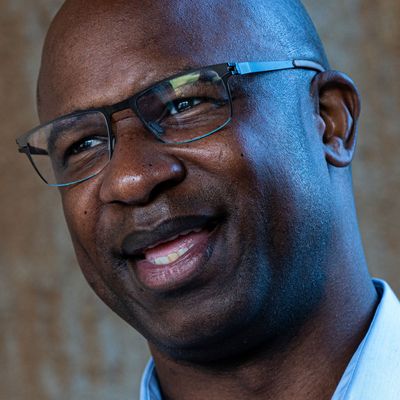
Though absentee ballots and votes by mail are yet to be counted — and there are an inordinate number of both, given current circumstances — one thing looks clear in the aftermath of Tuesday’s New York state primary: Congressman Eliot Engel’s political career is probably over. On Wednesday morning, Jamaal Bowman led the incumbent by over 25 points, a deficit that Engel, who has been in Congress since 1989, is unlikely to overcome. Bowman, a middle-school principal recruited by the progressive group Justice Democrats, had run significantly to Engel’s left; Bernie Sanders and Elizabeth Warren endorsed him, as did hometown progressives Alexandria Ocasio-Cortez, Jumaane Williams, and Jessica Ramos.
Bowman’s probable victory bolsters a key argument from the left — that Ocasio-Cortez’s 2018 win over Joe Crowley was not a fluke but evidence of brewing dissatisfaction with mainstream Democratic politics in New York.
For three decades, Engel rarely graced the 16th District with his presence. That pattern of political negligence somehow didn’t deter powerful local labor unions, including 32BJ SEIU, from endorsing him, nor from establishment Democrats like Chuck Schumer and Hillary Clinton doing the same. All their efforts were insufficient. So was Engel’s fundraising advantage, boosted by groups like the Democratic Majority for Israel. (Engel’s hawkish stance on Israel — he opposed the Iran nuclear deal and appeared at a pro-Israel rally with far-right, anti-Muslim blogger Pamela Geller in 2014 — mark him firmly as a Democrat of the past on that issue.)
Bowman’s upset wasn’t the left’s only likely victory on Tuesday. Alexandria Ocasio-Cortez smashed a primary challenge from her right: Her main competitor, former CNBC anchor Michelle Caruso-Cabrera, had fundraised heavily from Wall Street executives. In New York’s deep-blue 17th Congressional District, Mondaire Jones looks almost certain to win the Democratic nomination; the seat’s current occupant, Nita Lowey, is retiring. A supporter of Medicare for All, Jones will be the first Black and openly gay member of Congress. It’s a distinction he will likely share with Ritchie Torres, a City Council member who has likely won the primary race to represent the 15th Congressional District, another open seat. Torres beat, among others, Ruben Diaz Sr., an anti-gay Pentecostal minister who also sat on the City Council for years.
Incumbent Carolyn Maloney may also be in trouble. She leads primary challenger Suraj Patel by just over 500 votes, which means the race could swing dramatically after absentee ballots and votes by mail are counted. Even if Maloney manages to eke out a victory, that the contest is close at all isn’t ideal for the chairwoman of the powerful House Oversight Committee. Maloney had criticized Patel for his tactics, which included the use of dating apps as a means to canvass voters and for previous comments sexualizing Olympic gymnast McKayla Maroney, who was then a teenager. (A two-year-old petition to remove Patel as an adjunct NYU professor is still visible online.) Patel ran as a progressive alternative to Maloney, emphasizing his support for Medicare for All, but his closest competitor, Lauren Ashcraft, ran still further to his left. Ashcraft, a democratic socialist, currently trails him by 26 points.
In Brooklyn, progressive Jabari Brisport has an early lead over Tremaine Wright in the race for an open State Senate seat. Brisport, an active DSA member and teacher, previously ran for and lost a City Council race in 2017. If he defeats Wright, it’s significant: Wright is a sitting assemblywoman who left her seat in order to run for State Senate. And in Queens, socialist Zohran Mamdani leads incumbent Aravella Simotas in a race for a state assembly seat in Astoria. In Jackson Heights and Woodside, Jessica Gonzalez-Rojas has a significant lead over incumbent assembly member Michael DenDekker; she’d run on a platform that emphasized affordable housing, improved investment in the CUNY system, and bail reform. Incumbent progressive Jessica Ramos looks certain to defeat a primary challenge for her State Senate seat. Her fellow state senator Alessandra Biaggi looks secure in the Bronx, and so does Julia Salazar, a socialist.
Progressive insurgents will likely fail to unseat incumbent House representative Jerry Nadler, and another DSA-backed candidate, Phara Souffrant-Forrest, is down by just 588 votes in her race against incumbent assembly member Walter Mosely of Brooklyn. Forrest has not conceded the race, opting instead to wait until absentee ballots are counted. Win or lose, her strong showing suggests that voters in the New York City metro area are open to change — from the left.
Absentee ballots will probably not change what appears to be Tuesday’s key lesson: Machine politics is increasingly endangered in New York. For senior Democrats, this sets up a major challenge. Labor unions, who rely on Democratic incumbents to block assaults from the right, will have to reconsider their former calculations or risk looking aloof to the demands of the times. As inequality deepens, voters are seeking out candidates with bigger, more transformative ideas.






























